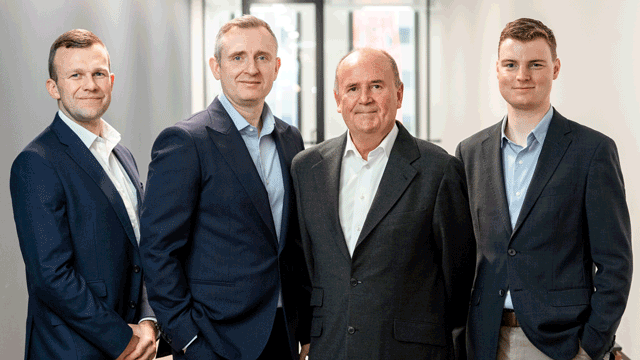 Did you hear the one about the 10 local councils, two governments, several quangos and about 180 miles of railway line?
Did you hear the one about the 10 local councils, two governments, several quangos and about 180 miles of railway line?
If it goes wrong, the Cardiff Capital Region City Deal – intended to realise the dream of a metro system for Cardiff and the Valleys – could end in one of the loudest laughs in Wales.
Like so many good gags, it contains real pathos and plenty of good intentions. Also like a good gag, some people just can’t take it seriously.
The £1.28bn plan emerged last year, culminating in announcements in November.
It was always going to be a big ask. Gillian Bristow of Cardiff University’s City Region Exchange says: “The challenge of promoting GVA growth across the region should not be underestimated and this is why a successful city deal must also look beyond headline investments in physical transport links, and develop the potential offered by local businesses and universities in stimulating higher-value employment growth.”
Bristow wants to see improvements to the skills base and warns that the benefits need to be spread across the region – no easy task.
Last November, the mood was upbeat. Michael Lawley, chairman of Cooke & Arkwright, was among the many hopeful property observers. “The opportunity to secure an effective injection of significant funding into infrastructure, such as the Cardiff Metro and Valleys Lines in particular, and securing political alignment across the Cardiff Capital Region, are big wins for business, investors and residents,” he said.
 Five months later, that upbeat mood is in danger of evaporating. Signs of progress are relatively slender. In December, regeneration minister Edwina Hart decided to replace the capital region board, appointed in 2013 and chaired by Roger Lewis, with a new transition board chaired by former BT Wales director Ann Beynon. JLL lead director Chris Sutton has a seat at the table.
Five months later, that upbeat mood is in danger of evaporating. Signs of progress are relatively slender. In December, regeneration minister Edwina Hart decided to replace the capital region board, appointed in 2013 and chaired by Roger Lewis, with a new transition board chaired by former BT Wales director Ann Beynon. JLL lead director Chris Sutton has a seat at the table.
Some fear long-standing local rivalries are beginning to suffocate a potentially good idea. Rhys James, head of Cushman & Wakefield’s Cardiff office, is hopeful – but not without reservations. “The Welsh government and Cardiff don’t appear to be working in harmony, and on the face of it, the city deal ought to bring them together,” he says.
But James is disappointed that there is no mention of the long-awaited M4 relief road, designed to resolve the Newport bottleneck. He sounds a nostalgic note for the long-defunct Welsh Development Agency. “You watch HSBC relocating to Birmingham and you think, that’s the kind of thing we’re out of touch with,” he says. “We need a regional body that ought to be a powerful voice, particularly if it can attract inward investment.”
It all adds up to a formidable list of tasks for the new economic development minister, due to be appointed after May’s Welsh general election (see box below).
Peter Constantine, senior regional director at Bilfinger GVA, is working from the same list as James. “I’d like the new government to get on with the major infrastructure projects that are the big brake on south Wales – we’ve been waiting for decades for the M4 relief road, which is a real deterrent to investment in the region. I’d like heads banged together.”
Could a Cardiff Capital Region elected mayor do the head-banging? “Ultimately, somebody has to make the decisions – we need leadership,” says Constantine. “There’s a council leaders group chaired by Andrew Morgan from Rhondda, but it’s hard to get everyone agreeing round the table. A clear decision-making process is needed, and if it’s not a mayor, it needs to be a clear executive [lead].”
Developers such as Rightacres are giving the City Deal a fair wind. Buoyed by Legal & General’s backing for its £400m Central Square project (see offices, p77), Rightacres has every reason to hope the metro scheme goes ahead. Trouble is, it isn’t sure.
Development director Stephen Widnall says: “There is money on the table, but is it going to one or two big projects to benefit the whole region, or will it be divided up among the 10 councils? Nobody knows yet, and the pot is not big enough to do both.”
Matt Phillips, managing partner at Knight Frank, has his fingers crossed. The local authority group chaired by Rhondda’s Andrew Morgan is praised as “a huge positive, not just a talking shop.” If Morgan can persuade fellow valleys leaders to buy into the metro project, it will be a real win, binding the region together. “This could do for Cardiff Capital Region what the trams are doing for Greater Manchester,” says Phillips.
Further official announcements are imminent. The City Deal is likely to be fleshed out in chancellor George Osborne’s March budget. It will be conveniently timed to win votes ahead of the Welsh general election in May.
Andrew Morgan, leader of Rhondda Cynon Taf County Borough Council and chairman of the Cardiff Capital Region City Deal leaders group, says: “We are optimistic that the chancellor will sign off on our bid in March and that is when the more detailed work on the development of the projects begins.
“That will mean working closely with key stakeholders and, in particular, closer involvement from the business community.”
Some expect the chancellor to prove that the City Deal just got serious. Or will he deliver the punchline? In a few days, we will find out.
City Deal – what is it?
The Welsh and UK governments each contribute £580m to the creation of a Cardiff Capital Region Fund. Ten local councils – Blaenau Gwent, Bridgend, Caerphilly, Cardiff, Merthyr Tydfil, Monmouthshire, Newport, Rhondda Cynon Taf, Torfaen and the Vale of Glamorgan – will raise additional funding through borrowing. Between them and a mooted new quango, Transport Wales, improved rail and metro lines will be delivered. Together with other projects, the City Deal is expected to help boost Welsh GVA
by 5%.
Hart retirement brings new era
The Welsh and UK governments each contribute £580m to the creation of a Cardiff Capital Region Fund. Ten local councils – Blaenau Gwent, Bridgend, Caerphilly, Cardiff, Merthyr Tydfil, Monmouthshire, Newport, Rhondda Cynon Taf, Torfaen and the Vale of Glamorgan – will raise additional funding through borrowing. Between them and a mooted new quango, Transport Wales, improved rail and metro lines will be delivered. Together with other projects, the City Deal is expected to help boost Welsh GVA
by 5%.
Names to watch
One civil servant and two local council leaders will be key to the City Deal’s success or failure. James Price is the Welsh government’s deputy permanent secretary for economy, skills and natural resources. A former chief economist at the WDA, Price is tipped to run the metro project, perhaps as chair of a new Transport Wales quango.
Andrew Morgan, the Labour leader of Rhondda Cynon Taf, is widely praised for chairing the local authorities group, and Peter Fox, Conservative leader of Monmouthshire, is vice-chair of the city region transition board. Both are tipped for a big future in Welsh politics.










